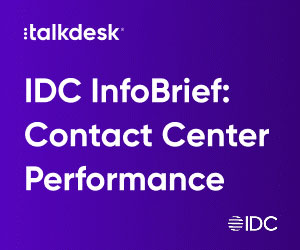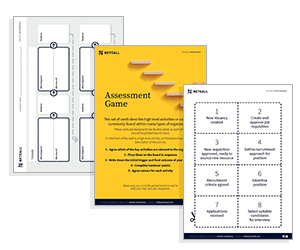Empowering agents has always been key to delivering exceptional customer experiences, but the means to achieve this are constantly evolving.
So, what’s now possible in 2025? We asked the experts to find out…
12 Ways to Empower Agents
1. Allow Agents to Move Their Breaks and Adjust Call Times

Providing self-scheduling capabilities is a great way for contact centres to empower their agents. Giving agents control over their schedules, allowing them to move their breaks or adjust call times, can have a huge impact on their work–life balance and job satisfaction.
Offering these flexible options and operating transparent holiday booking processes all play a part in creating fairer schedules, which have been proven to reduce attrition.
However, according to Calabrio research, 46% of agents in European contact centres still lack self-scheduling capabilities, and only 6% of agents manage their schedules autonomously.
There is a big opportunity for 2025 to be the year that contact centres embrace self-scheduling to empower and improve agent experience
Contributed by: Ed Creasey, Vice President of Solution Engineering, Calabrio
2. Embrace Personalized Learning Experiences (Not a One-Size-Fits-All)

Traditional training methods are no longer enough to keep up with the demands of modern contact centres. In 2025, businesses must embrace personalized learning experiences to empower people.
Intelligent coaching tools will analyse agent performance and offer personalized feedback, enhancing skills development without adding pressure.
By integrating AI seamlessly into their workflows, contact centres can ensure agents feel confident, supported, and able to deliver the best possible service.
“It’s not about replacing humans, it’s about assisting humans.”
Contributed by: Lisa Orford, Vice President for Contact Centre, 8×8
3. Make Sure Your Agents Know How to Get the Best From AI Tools

As AI reshapes interactions, it is also redefining agent skill profiles: timeless skills – such as active listening, critical thinking, and problem-solving – and AI literacy.
AI literacy ensures agents and supervisors know how to use and get the best from AI tools, including prompt writing.
Meanwhile, day-to-day, adaptive learning models – driven by AI coaching insights, microlearning, gamification, and real-time feedback – support continuous learning as agents navigate evolving workflows.
Contributed by: Jean-Pierre Moneyrac, Principal Product Marketeer, Odigo
4. Empower Agents to Exchange Shifts With Colleagues Who Have Matching Skills, Availability, and Contractual Hours

Choosing workforce management solutions with employee-centric features will help businesses better support their teams from the get-go.
With tools like shift-swapping, agents can exchange shifts with colleagues who have matching skills, availability, and contractual hours, allowing for flexibility while maintaining service standards.
Shift-bidding further enhances empowerment by enabling agents to select their preferred shifts, promoting autonomy and improving job satisfaction.
These features collectively help agents achieve a healthier work–life balance, reducing burnout and increasing engagement.
By adopting people-first solutions, businesses can foster a more supportive work environment, attract top talent, and create a motivated, high-performing workforce.
WFM solutions with AI-driven tools like smart scheduling can also help businesses optimize time management by automatically identifying the best time slots for 1:1s, group sessions, or self-learning.
This ensures that agents can access training opportunities without disrupting their shifts or customer service duties.
Contributed by: Isabel Lim, Product Marketing Manager, peopleware
5. Make It Easier for Agents to Move on to the Next Customer Conversation

AI can simply supplement agent skills where needed – for example by making proactive response suggestions from your knowledge base, or automating conversation summaries so agents can move more quickly on to the next one.
It can also take over routine interactions, leaving agents free, and without pressure, to add value with more complex engagements – giving them more opportunity to deliver satisfaction with correspondingly greater job enjoyment.
Contributed by: Peter Fedarb, Solutions Architect, Enghouse Interactive
6. Shift KPIs From Rigid Diagnostic Metrics (Like AHT) to Customer-Centric Outcomes

Empowerment equals responsibility. Customer service leaders should empower agents by shifting KPIs from rigid diagnostic metrics like average handle times and abandonment rates to customer-centric outcomes such as NPS.
AI-driven solutions should then handle these diagnostics, freeing agents to focus on delivering meaningful customer interactions.
Alongside this, flexible work models, self-service scheduling, and employee-driven preferences all enhance autonomy, while an employee-first mindset – reinforced by eSat surveys, recognition programmes, and WFM partnerships – drives engagement.
However, investing in emotional intelligence and AI collaboration training will be essential. Technology should empower, not hinder, creating a workplace where agents feel valued, supported, and equipped to deliver outstanding customer experiences.
Contributed by: Sue Bolt, Director, Solution Engineering, Workforce Augmentation, NICE International
7. Create an Environment for Prioritizing Emotional Connections With Customers

AI software that provides real-time guidance during complex customer interactions can help contact centres empower their agents.
These tools offer immediate access to relevant information, sentiment analysis, and suggested resolutions, allowing agents to focus on building emotional connections while having instant knowledge support.
The benefits are substantial: reduced cognitive load by eliminating the need to navigate between five and ten different IT applications, more efficient post-call work, and improved first-contact resolution rates.
Most importantly, this shift transforms the agent role from information processor to problem solver, allowing them to exercise judgement and creativity in addressing customer needs.
Contributed by: Ben Booth, CEO, MaxContact
8. Liberate Agents From Mundane Work by Diverting FAQs That a Chatbot Can Answer

Empowering agents is about liberating agents from mundane work and mitigating workflow inefficiencies. Agents’ interactive IQ strengths are best expressed when they feel unfettered. AI-powered solutions help do this for pre/post-call activity.
Conversational AI and smart routing help divert FAQs that a chatbot can answer so agents focus on queries requiring higher-order thinking.
AI can mitigate agent panic and frustration, acting as an intelligent assistant, pre-fetching customer history and delivering targeted answers quickly through smart scripts and knowledge articles.
AI can also serve as a behind-the-scenes partner to handle repetitive work like post-call summaries and recommend the next-best actions, such as a callback or text notification.
Contributed by: Toussaint Celestin, AI Product Marketing Manager, Talkdesk
For more on empowering agents, also take a look at our Recorded Webinar: Empowering Agents to Deliver Exceptional Customer Experiences
9. Be More Objective About How You Identify Training Opportunities and Recognize Top Performers

Empowering agents in 2025 is all about leveraging AI to identify methods to support, train, and praise agents.
AI-powered automated quality assurance is a game changer because it provides full visibility into agent performance across all calls.
AutoQA scores interactions objectively, helping managers identify training opportunities and recognize top performers.
With automated quality assurance, managers can boost agent performance by praising agents and creating data-driven training to agents who need additional assistance.
Contributed by: Jonathan “Kenu” Escobedo, Customer Success Manager, Miarec
10. Give Agents What They Need to Get Things ‘Right First Time’

Technology needs to seamlessly integrate to empower agents including contact centre, CRM and other line-of-business applications.
This ensures agents have a full view of customer intent, relationship, and interaction history, allowing them to engage meaningfully and get things ‘right first time’. This optimizes average handle time (AHT) and reduces frustration and repeat contacts.
Management oversight is still also critical to developing and empowering agents, using feedback loops to foster continuous improvement. This can also help identify technology gaps and further refine business processes.
Contributed by: Lewis Gallagher, Senior Solutions Consultant, Netcall
11. Give Every Agent Access to a Personal Assistant

True empowerment comes from AI handling transactional work effectively so agents can focus on complex, high-stakes conversations.
It also means AI acts as a personal assistant, surfacing relevant data, summarizing past interactions, and automating follow-ups. This means agents can spend less time digging for context and more time helping customers solve their issues.
The goal isn’t fewer agents. It’s better jobs, where support teams can do work that’s skilled, strategic, and uniquely human.
Contributed by: Sam Dehart, Product Community Manager, Assembled
12. Help Agents Resolve Issues Faster While Reducing Cognitive Load

Empowering contact centre agents goes beyond just better tools – it’s about intelligent automation, AI-driven insights, and flexible work environments that enhance both agent efficiency and customer experience.
AI-powered assistance, like real-time transcription, sentiment analysis, and intelligent recommendations, helps agents resolve issues faster while reducing cognitive load.
Automated workflows streamline repetitive tasks, allowing agents to focus on the conversation. Meanwhile, integrated workforce engagement management (WEM) ensures smarter scheduling and career development opportunities – improving both performance and retention.
Contributed by: Tara Aldridge, Strategic Services Director, Vonage
13. Use AI Tools to Enhance Agent Skills

As AI changes job roles and expectations, AI solutions for customer self-service have surged in recent years.
While automation is essential, forward-thinking organizations are now harnessing AI to enhance their human agents’ skills, training, motivation, and performance – key drivers of exceptional customer experiences.
By 2025, AI strategies will go beyond automation, leveraging data to provide personalized insights that empower employees and leaders.
AI will drive individualized learning paths, tailored performance plans, personalized coaching, and automated recognition to boost motivation.
Leaders will gain real-time visibility into performance trends, employee sentiment, learning gaps, and engagement, enabling proactive, data-driven decisions.
The future of AI isn’t just about improving self-service; it’s about elevating human potential, creating more engaged employees, and ultimately delivering superior customer experiences.
Contributed by: Corey Mustard, Director of Solutions Engineering at Centrical
Foster an Environment Where Agents Can Thrive
Empowering contact centre agents isn’t just about giving them better tools – it’s about fostering an environment where they can thrive.
AI is playing an increasingly pivotal role in achieving this, as a supportive partner that enhances efficiency, reduces cognitive load, and enables agents to focus on high-value interactions.
The key to success lies in adopting a people-first mindset. In 2025, the most successful contact centres will be those that empower their agents – not just to work smarter, but to deliver more meaningful, impactful customer service every day.
Have You Tried Anything New to Help Empower Your Agents?
Join our LinkedIn community and let us know.
For more great insights and advice from our panel of experts, read these articles next:
- From Chaos to Control! Why Contact Centres Are Prioritizing WFM Solutions
- Can AI Really Handle Customer Complaints?
- Quick Wins to Improve Your C-Sat Scores
- 10 Questions to Ask When Buying Your Next CCaaS Solution
Author: Megan Jones
Reviewed by: Jo Robinson
Published On: 31st Mar 2025 - Last modified: 10th Apr 2025
Read more about - Call Centre Management, 8x8, Assembled, Ben Booth, Calabrio, Centrical, Ed Creasey, Employee Engagement, Empowering Agents, Enghouse Interactive, Isabel Lim, Jean-Pierre Moneyrac, Jonathan Kenu Escobedo, Leadership, Lewis Gallagher, Lisa Orford, MaxContact, MiaRec, Netcall, NiCE, NiCE CXone, Odigo, Peopleware, Peter Fedarb, Sam Dehart, Talkdesk, Tara Aldridge, Team Management, Top Story, Toussaint Celestin, Vonage





















